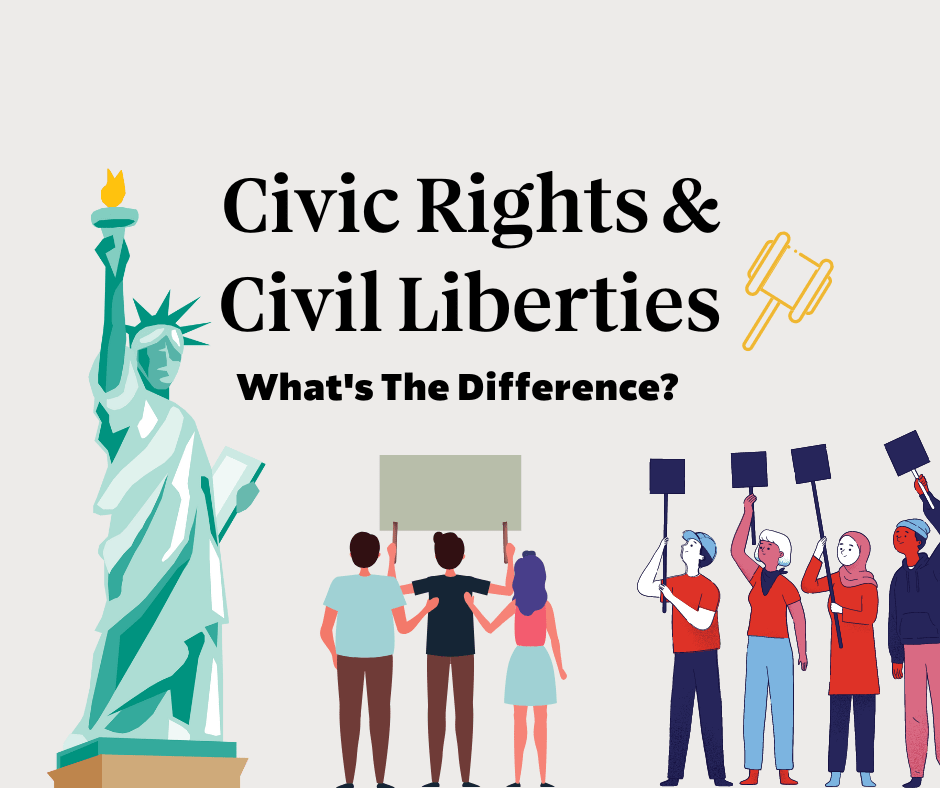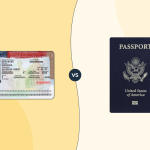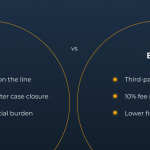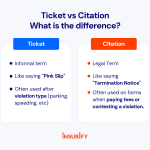Have you ever wondered what truly separates civil rights from civil liberties? It’s a question that might seem simple at first glance, yet it holds profound significance in your daily life.
Understanding these two concepts can empower you to better comprehend the legal protections you have and the freedoms you enjoy. Imagine knowing exactly where your rights end and your liberties begin. This knowledge can change how you view the world and interact with it.
We will break down the differences between civil rights and civil liberties in a straightforward way, ensuring you grasp the essentials without any confusion. By the end, you’ll not only be able to distinguish between these terms but also understand how they directly impact your life. Ready to dive in and unlock the power of knowledge? Let’s get started!
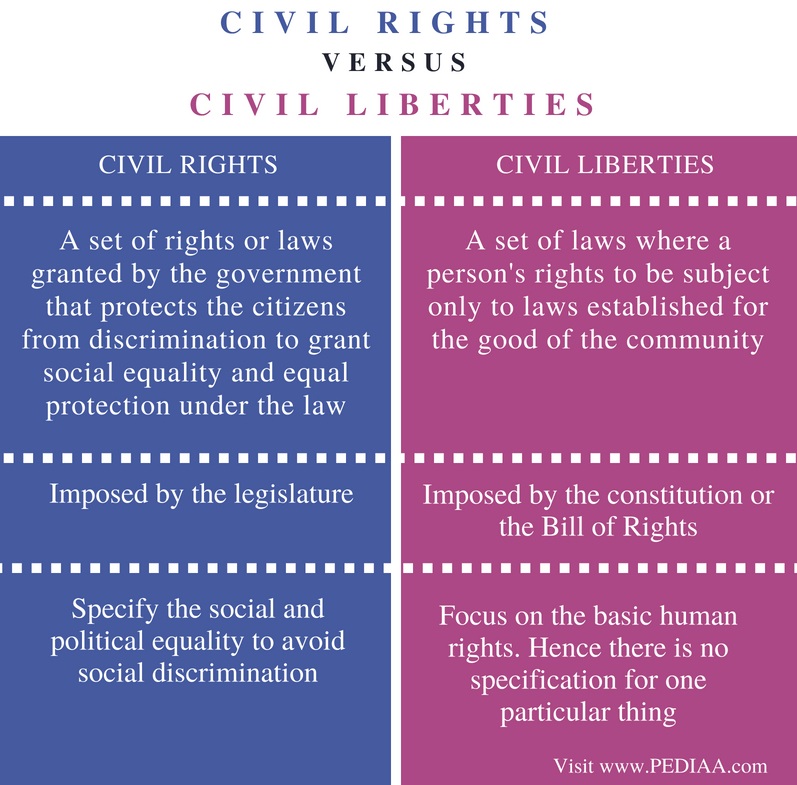
Civil Rights Definition
Civil rights focus on protecting individuals from discrimination based on characteristics like race or gender. Civil liberties involve basic freedoms guaranteed by the Constitution, such as freedom of speech or religion. Both ensure protection and fairness, but they address different aspects of human rights.
Civil rights are essential in ensuring every individual is treated equally under the law, regardless of race, gender, or religion. These rights are the backbone of a fair and just society, providing a safety net against discrimination. Understanding civil rights helps you recognize the importance of equality in your daily life and the broader community.What Are Civil Rights?
Civil rights are protections and privileges granted by the government to ensure equal treatment. They are designed to guard against discrimination and inequality. These rights are typically enshrined in laws and policies, safeguarding individuals from unfair treatment based on characteristics like race, gender, age, disability, and more. Consider how civil rights impact your life. Have you ever attended a school where everyone had the same opportunities, regardless of their background? This is a direct outcome of civil rights laws.Examples Of Civil Rights
Civil rights include a variety of fundamental rights, such as: – Voting rights: Ensuring every citizen has a voice in elections. – Equal employment opportunities: Prohibiting discrimination in hiring and promotion practices. – Access to public services: Ensuring all individuals can use public facilities like schools and transportation. These examples highlight how civil rights create a more inclusive society.Why Are Civil Rights Important?
Civil rights are crucial in maintaining social harmony and justice. They empower individuals to challenge discrimination and demand fair treatment. By upholding civil rights, societies can work towards eradicating systemic inequality. Reflect on a time when you felt included or excluded. How did it shape your perception of fairness and equality? Understanding civil rights can help you advocate for justice in your community.Challenges In Civil Rights
Despite advancements, challenges persist. Discrimination can still occur in subtle ways. Laws might be in place, but enforcing them is often a complex task. Consider the ongoing debates about voting access and the right to protest. These issues underscore the importance of being vigilant about protecting civil rights. Civil rights are not just historical achievements; they are living, breathing components of our everyday lives. They remind us of our shared responsibility to ensure fairness and equality for everyone. What role can you play in safeguarding these essential rights? Engage with your community, stay informed, and advocate for justice.Civil Liberties Definition
Civil liberties are fundamental freedoms. They are protected by law. These rights allow individuals to live freely. The government cannot infringe upon them without due process. Civil liberties ensure personal freedoms and limit government power.
What Are Civil Liberties?
Civil liberties are rights given to individuals. They are often guaranteed by the constitution. These include freedom of speech, religion, and assembly. They provide a basis for a free society. Citizens can express opinions without fear.
Examples Of Civil Liberties
Freedom of speech is a key civil liberty. It allows people to speak their minds. Another example is the right to privacy. Individuals can keep personal matters private. Freedom of religion permits worship as one chooses. These liberties protect personal freedoms.
Importance Of Civil Liberties
Civil liberties are crucial for democracy. They allow citizens to challenge authority. They protect minority rights in society. Without them, a government could become oppressive. Civil liberties create a balance of power. They ensure no one is above the law.
Historical Context
Understanding the historical context of civil rights and civil liberties helps explain their differences. Both concepts play a role in shaping societies. They have unique origins and developments. Let’s dive into their history.
Origins Of Civil Rights
Civil rights emerged from the need for equality. They focus on ensuring equal treatment for all. In the United States, civil rights gained momentum post-Civil War. The 13th, 14th, and 15th Amendments were crucial. These amendments abolished slavery and granted citizenship and voting rights to African Americans. The Civil Rights Movement of the 1960s further advanced these rights. Leaders like Martin Luther King Jr. advocated for equality and justice. The movement aimed to end racial segregation and discrimination.
Origins Of Civil Liberties
Civil liberties stem from the desire for freedom from government control. They protect individual freedoms. The U.S. Constitution and the Bill of Rights are key foundations. These documents outline liberties like freedom of speech and religion. Civil liberties ensure protection from government overreach. They allow individuals to express themselves freely. They also safeguard personal privacy and due process. Historical events, such as the drafting of the Magna Carta in 1215, influenced modern civil liberties. This document limited the power of the monarchy and upheld individual rights.
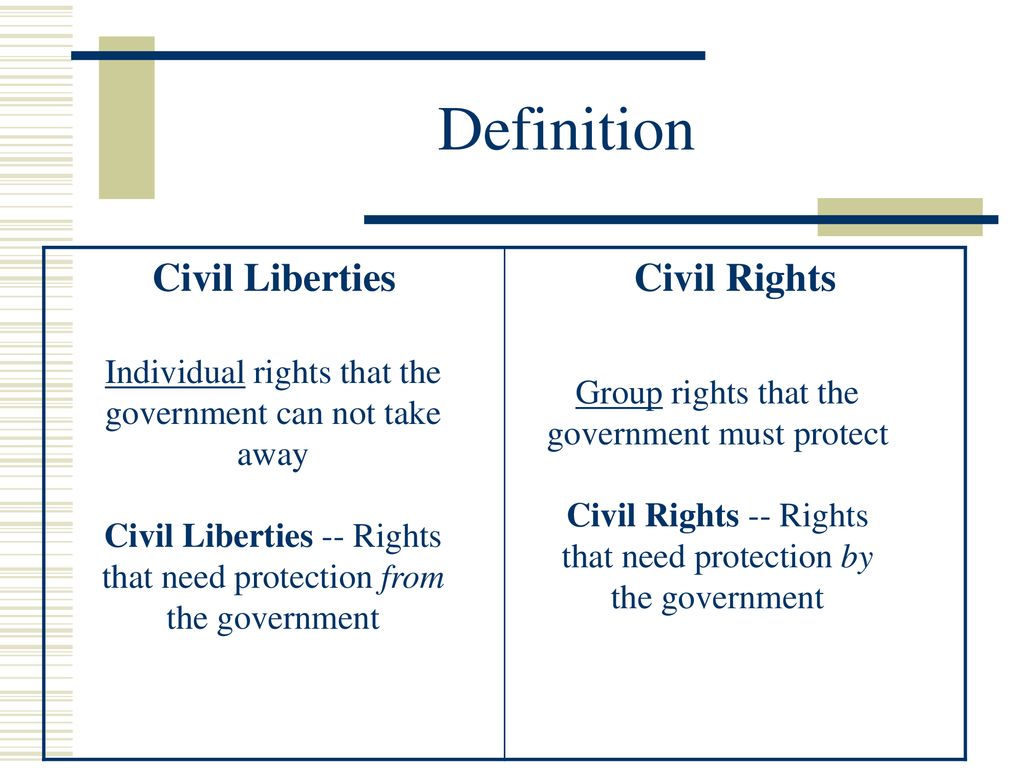
Legal Framework
Civil rights protect individuals from discrimination based on characteristics like race or gender. Civil liberties safeguard freedoms, such as speech and privacy, against government interference. Understanding these terms helps clarify legal protections in society.
Understanding the legal framework that shapes civil rights and civil liberties is essential to grasp their differences. Both concepts are rooted in the laws and regulations designed to protect individuals. Yet, they arise from distinct legal sources and have unique applications. Let’s dive into these aspects through constitutional amendments and landmark legislation.Constitutional Amendments
The U.S. Constitution is the bedrock of civil liberties. These liberties are protections against government actions that could infringe on individual freedoms. The Bill of Rights, the first ten amendments, is a prime example. It ensures freedom of speech, religion, and the press, among others. Civil rights, however, are not primarily sourced from the original Constitution. They are often derived from later amendments. The 14th Amendment, for instance, guarantees equal protection under the law. This amendment has been pivotal in civil rights movements, ensuring that everyone is treated equally regardless of race, gender, or other characteristics.Landmark Legislation
While constitutional amendments lay the foundation, landmark legislation brings these principles into action. Civil rights laws often emerge from a need to address societal inequalities. The Civil Rights Act of 1964 is a prime example. It prohibits discrimination based on race, color, religion, sex, or national origin. This act transformed workplaces and public spaces, ensuring equal access and opportunities. In contrast, civil liberties are often reinforced through court decisions rather than legislation. Consider the case of Miranda v. Arizona. This Supreme Court ruling established the Miranda rights, protecting individuals during police interrogations. It exemplifies how civil liberties can be safeguarded through judicial interpretation. The legal framework of civil rights and civil liberties is complex yet fascinating. Have you ever considered how these laws impact your daily life? Understanding these differences not only empowers you but also helps you appreciate the freedoms and rights you enjoy.Key Differences
Civil rights ensure equal treatment and protection under the law. Civil liberties protect individual freedoms like speech and privacy. These concepts, while related, focus on different aspects of personal and legal rights.
Understanding the distinction between civil rights and civil liberties is crucial for anyone interested in law, politics, or social justice. These terms are often used interchangeably, but they refer to different protections and principles. Civil rights focus on equality and protection from discrimination, while civil liberties emphasize individual freedoms. By grasping the key differences, you can better appreciate how these concepts shape society and influence your daily life.Scope And Focus
Civil rights are primarily concerned with ensuring equal treatment under the law. They protect you from discrimination based on race, gender, disability, and other characteristics. Think of civil rights as a shield, safeguarding you against unfair treatment in public spaces, workplaces, and institutions. Civil liberties, on the other hand, are about protecting your personal freedoms. They guarantee your ability to express yourself, practice your religion, and enjoy privacy. Imagine civil liberties as a pair of wings, allowing you to freely navigate your personal and public life without undue interference. Have you ever considered how these protections influence your choices daily? Whether it’s voting in an election or expressing your opinion online, both civil rights and liberties play a role in ensuring you have the freedom and equality to do so.Enforcement Mechanisms
Civil rights often require active enforcement through legislation and governmental action. Laws such as the Civil Rights Act are designed to prevent discrimination and promote equality. They rely on government agencies and courts to uphold these protections and address violations. Civil liberties are typically upheld through constitutional safeguards. For instance, the First Amendment in the U.S. Constitution protects your freedom of speech and religion. Courts play a crucial role in interpreting these liberties and defending them against government overreach. Consider how this affects your interactions with authority. Civil rights rely on systemic changes and legal frameworks, while civil liberties often require vigilance and advocacy to maintain personal freedoms. These differences not only shape legal frameworks but also influence how you engage with societal norms and expectations. Are you aware of your rights and liberties? Recognizing these distinctions empowers you to advocate for justice and freedom in your community.Examples In Practice
Civil rights focus on equality and protection against discrimination, ensuring fair treatment in public spheres. Civil liberties refer to individual freedoms, like speech and privacy, safeguarded from government interference. Understanding these differences helps navigate legal rights effectively.
Understanding the difference between civil rights and civil liberties can sometimes feel like deciphering a complex puzzle. However, when you see them in practice, things become clearer. Let’s explore some real-world examples to understand how these two critical concepts play out in our everyday lives.Civil Rights Movements
Civil rights movements have shaped societies around the globe. In the United States, the Civil Rights Movement of the 1960s sought to end racial segregation and discrimination. You may have heard of the legendary march on Washington where Dr. Martin Luther King Jr. delivered his iconic “I Have a Dream” speech. Think about how these movements have paved the way for laws like the Civil Rights Act of 1964, which prohibits discrimination based on race, color, religion, sex, or national origin. This legislation has had a profound impact on education, employment, and public spaces, ensuring equal treatment for all. How different would our workplaces be without such pivotal changes?Civil Liberties Cases
Civil liberties often come into focus through landmark court cases. Consider the famous Supreme Court case of Miranda v. Arizona in 1966. This case led to the creation of the “Miranda rights,” ensuring that individuals are informed of their rights to remain silent and have an attorney during police interrogations. Imagine being arrested without knowing your rights. The Miranda rights protect you from self-incrimination and ensure fair treatment under the law. Another crucial case, Roe v. Wade, highlighted the right to privacy, impacting women’s access to reproductive healthcare. Each of these cases underscores the ongoing battle to protect individual freedoms. Have you ever wondered how your day-to-day life might change without these safeguards? By looking at these examples, you can see how civil rights and civil liberties intersect and impact your life. How do these protections influence your daily interactions and sense of freedom? Recognizing their importance is the first step in appreciating the rights you enjoy.Contemporary Issues
Understanding the difference between civil rights and civil liberties is crucial as we navigate contemporary issues. In today’s world, both are at the forefront of political discussions and social movements. They dictate how individuals interact with the government and each other. But what are the current challenges and debates surrounding them? Let’s dive deeper into these pressing matters.
Current Civil Rights Challenges
Today, civil rights are facing significant hurdles. Discrimination based on race, gender, and sexual orientation remains a persistent issue. Despite progress, marginalized communities still struggle for equal treatment. Think about the debates around voting rights. Many believe that restrictive voting laws disproportionately affect minorities, raising questions about true equality.
Social media has become a battleground for civil rights. It amplifies voices but also spreads misinformation. How do we ensure that truth prevails in this digital age? Activists use platforms to advocate for change, but they also face harassment and censorship. This raises a crucial question: Are civil rights adequately protected in cyberspace?
Debates Around Civil Liberties
Civil liberties, on the other hand, often spark intense debates. The balance between security and freedom is constantly questioned. Governments implement surveillance measures, claiming they are necessary for safety. Yet, many argue these actions infringe on personal privacy. How much freedom are you willing to sacrifice for security?
Freedom of speech is another hot topic. While it’s a fundamental right, its limits are frequently tested. Hate speech and misinformation challenge the boundaries of free expression. Should there be stricter regulations, or does that threaten liberty? Your stance may hinge on whether you prioritize safety or freedom.
These contemporary issues affect us all. Understanding them empowers you to make informed decisions and advocate for change. What actions will you take to contribute to the discussion and shape the future of civil rights and liberties?
Global Perspectives
Understanding civil rights and civil liberties is crucial worldwide. Different countries interpret these concepts uniquely. This diversity affects citizens’ daily lives. Let’s explore how various nations view civil rights and civil liberties. Gain insight into global perspectives.
International Civil Rights
Civil rights focus on equality and fairness. Countries have different laws and policies. In many nations, civil rights are written in the constitution. These rights protect against discrimination. They ensure equal treatment for all citizens. Each country defines civil rights based on its history and culture. For example, the United States emphasizes freedom of speech and religion. South Africa stresses racial equality due to its apartheid history. In Europe, civil rights often focus on privacy and data protection.
Civil Liberties In Different Cultures
Civil liberties protect individual freedoms. These include freedom of speech, assembly, and religion. Each culture interprets these liberties differently. In some regions, freedom of speech faces restrictions. Governments may limit speech for national security. In other areas, religious freedom takes precedence. Countries with diverse populations often prioritize religious rights. Some nations balance civil liberties with social harmony. This balance shapes how citizens experience freedom. Understanding these differences is key to grasping global perspectives.

Frequently Asked Questions
What Are Civil Rights?
Civil rights are legal protections against discrimination. They ensure equal treatment in various areas like employment and education. These rights are typically enforced by laws and government actions. They aim to prevent unfair treatment based on race, gender, disability, and other characteristics.
What Are Civil Liberties?
Civil liberties are fundamental freedoms guaranteed by the Constitution. They include freedom of speech, religion, and privacy. These liberties protect individuals from government overreach. Unlike civil rights, civil liberties focus on limiting government power rather than promoting equality.
How Do Civil Rights Differ From Civil Liberties?
Civil rights focus on equality and protection from discrimination. Civil liberties are about individual freedoms and limiting government power. Civil rights often require government action to enforce. Civil liberties require government restraint to protect individual freedoms.
Why Are Civil Rights Important?
Civil rights ensure equal treatment and prevent discrimination. They promote fairness in society by providing legal protections. Without civil rights, marginalized groups may face discrimination in employment, education, and other areas. Ensuring civil rights fosters a more just and equitable society.
Conclusion
Civil rights and civil liberties protect different aspects of freedom. Civil rights focus on equality and fairness in society. Civil liberties safeguard personal freedoms from government interference. Both are crucial for a just society. Understanding these differences empowers citizens. It ensures informed participation in civic duties.
Awareness helps protect personal freedoms and rights. Knowing these concepts strengthens community bonds. A well-informed public fosters a healthier democracy. Stay engaged and informed. Your rights and freedoms depend on it.

I’m someone who’s always been fascinated by how small differences can lead to big understanding. That’s why I love writing “What’s the difference between…” content; it helps me explore topics from multiple angles and explain them in a clear, practical way. Whether it’s tech, productivity, business, or everyday decisions, I enjoy making complex ideas easier to compare, understand, and act on.
